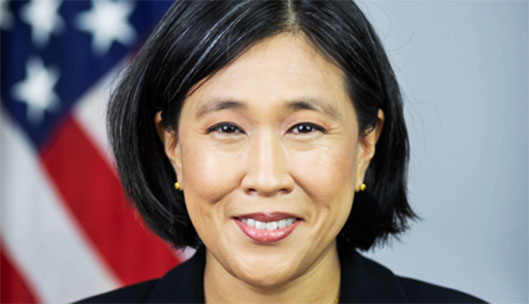By Khadidja Ba
On a brief visit to Guyana, US Trade Representative (USTR) Katherine Tai yesterday said that Wash-ington’s approach to trade policy was to put workers at the centre of discussions.
In an exclusive interview with Stabroek News at the US Embassy, Tai had been asked about the US’s responsibility in relation to the conduct here of American companies such as ExxonMobil and Hess.
She responded by detailing the Biden-Harris administration’s approach to trade policy. “At the beginning of this administration, President Biden and Vice President Harris gave me two main charges. The first was to actively engage with all partners and reassure them that America is back. The second was to introduce a new approach to trade policy,” she explained.
Ambassador Tai underscored that under the current administration, trade policy is designed to place workers at the centre of discussions. “Our goal is not just to increase trade, but to ensure that trade benefits more people. This approach recognizes that workers are a crucial element in the economic equation. Our trade policies aim to create opportunities for livelihoods, improve lives, and provide brighter prospects for future generations,” she said. She noted that while private sector involvement remains crucial, the focus is on ensuring that corporate actors like Exxon-Mobil adhere to responsible practices, emphasizing the importance of sustainability and respect for local communities.
Addressing concerns raised about the exploitation of oil resources in Guyana, particularly allegations that ExxonMobil has imposed unfavourable terms which do not help to alleviate poverty, Ambassador Tai acknowledged the complexities of such issues. “While the USTR is not directly involved in specific transactions, we do set the rules and parameters for economic engagement. One of our critical responsibilities is to push for the evolution of the international trading system,” she stated.
Tai highlighted the need for a reformed version of globalization that prioritizes people over corporate profits and avoids exploitation. “Our aim is to evolve the rules of trade to encourage more responsible behavior and better outcomes. This includes ensuring that future globalization efforts are more invested in the well-being of people and less focused on mere corporate bottom lines,” she said.
She reaffirmed the commitment of the USTR to fostering an environment where trade policies benefit not just businesses but also the communities and workers who are integral to economic development. Her visit to Guyana, and her broader engagement with CARICOM, reflect a strategic effort to align U.S. trade policies with both regional and global economic realities.
She said her trip had a dual focus: deepening bilateral economic relations and engaging with regional partners within the Caribbean Community (CARICOM).
“The objectives of this trip are twofold. Firstly, to gain a deeper understanding of Guyana as a country and to engage with its government leaders to enhance our bilateral economic relationships. Secondly, to engage with CARICOM trade ministers here in Guyana, which is the seat of CARICOM, to discuss how the United States cannot only strengthen its economic and trade relationships with Guyana but also broaden these efforts across the entire Caribbean region. We aim to explore ways to deepen our economic ties and trade policies with the Caribbean as a whole”, she said






